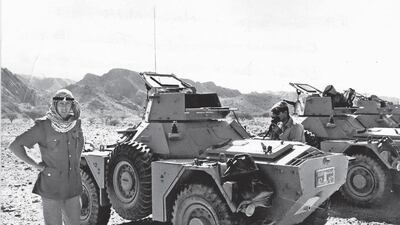It was a relatively low-key event for what amounted to a reversal in a 44-year-old international military strategy.
UK foreign secretary, Philip Hammond, arrived at a dusty and largely empty dockside in Manama, Bahrain, at the weekend for the inauguration of HMS Juffair, the UK's first permanent military base east of Suez since 1971.
The groundbreaking ceremony came complete with a very presidential-looking SUV cavalcade, polished spades and a photo opportunity alongside Bahraini foreign minister Sheikh Khalid bin Ahmed Al Khalifa, who described the link between Britain and Bahrain as a centuries-old “historic relationship”.
Following a series of recent and very public diplomatic spats between the UK and Saudi Arabia, and preceding the international talks on Syria in Vienna on Friday, the timing of the British minister’s visit was seen as significant.
However, the BBC’s security correspondent, Frank Gardner, chose to define the tour of Qatar, Bahrain, Saudi Arabia and the UAE as an attempt by the British government to “deepen economic and military ties with the Arab Gulf states and especially their ruling families”.
Those ties – and the complex and at times contradictory relationship between the UK government and the various ruling families in the Emirates – are also the subject of a new and often surprising memoir that is being featured at the Sharjah International Book Fair this weekend.
A Soldier in Arabia is David Neild's account of his life in the region since 1959, a time when the then 20-year-old Englishman knew an older HMS Jufair (sic). It was one of only two places in Bahrain where it was possible to watch an open-air movie and when Sharjah was home to the Trucial States' only airport and hotel, the British Overseas Airways Corporation (BOAC)-owned Speedbird.
Neild had been sent to the Trucial States as the youngest-ever officer in the Trucial Oman Scouts, the forerunner of today’s UAE Union Defence Force, a position that not only allowed him to experience life in the Emirates before the impact of oil but which also prepared him for the experiences that were to define his later life.
In 1968, after two tours of duty with the Trucial Oman Scouts, Neild resigned his commission from the British Army and entered the service of the Ruler of Ras Al Khaimah, Sheikh Saqr bin Mohammed Al Qasimi, for whom he established an independent army, the Ras Al Khaimah Mobile Force; a role the Englishman would repeat a few years later when he established a second defence force, the Sharjah National Guard, for the ruler of the neighbouring emirate.
"The Colonel" successfully and peacefully played a role in defusing tribal tensions, and even met The Beatles in Paris. But despite the fact that Neild's career had episodes that were far from ordinary, in many ways A Soldier in Arabia is a typical memoir from an expat who came to the Gulf and "got sand in the blood".
With its tales of friendship, eccentricity, hardship and heat, it is an account of expat life in Ras Al Khaimah that complements Sheila Bevan's The Parting Years, and as a military memoir, Neild's book sits alongside Peter Clayton and Antony Cawston's Two Alpha Lima and Michael Curtis's Arabian Days as a history of the Trucial Oman Scouts.
Where A Soldier in Arabia differs from those accounts, however, is in its use of archival research (Neild was assisted with this by the Gulf specialist Dr Ash Rossiter, an assistant professor in the Institute of International and Civil Security at Abu Dhabi's Khalifa University), and in Neild's proximity to so many of the period's key personalities and events.
Not only is Neild able to recall events such as the seizure in 1971 of Abu Musa and the Greater and Lesser Tunbs by Iran, he delivered the news of the invasion to Sheikh Saqr personally. But A Soldier in Arabia also outlines the various events that played a defining role in the early history of the UAE.
For Dr Matthew MacLean, a historian of the UAE and a visiting scholar at the Sheikh Saud bin Saqr Al Qasimi Foundation for Policy Research in Ras Al Khaimah, the value of A Soldier in Arabia stems from its description of the wider forces that were involved in the Emirates' transformation from tradition to modernity.
“Like other parts of the Emirates, Ras Al Khaimah has always been as much a part of the Indian Ocean world as it has been part of the Middle East and the Arab world, and those connections are still very much alive, but in the 1950s and 1960s the whole region started to reorient itself politically, socially and economically towards the Arab world and the Middle East,” Dr MacLean explains.
“All of this was happening at the same time, when local rulers were trying to extend their influence into the country, and this was the process that David Neild was involved in.”
Despite the many episodes in a remarkably eventful life, Lieutenant Colonel (retired) David Neild continues to live in Ras Al Khaimah where he is living proof of the peculiar proximity between biography and history that exists in the Gulf – a place where, as the BBC’s Frank Gardner so correctly identified, personalities and personal relationships have a close and tangible bearing on the wider forces of history.
• A Soldier in Arabia by David Neild (Medina Publishing, Dh120) is on sale now.
Nick Leech is a features writer at The National.

